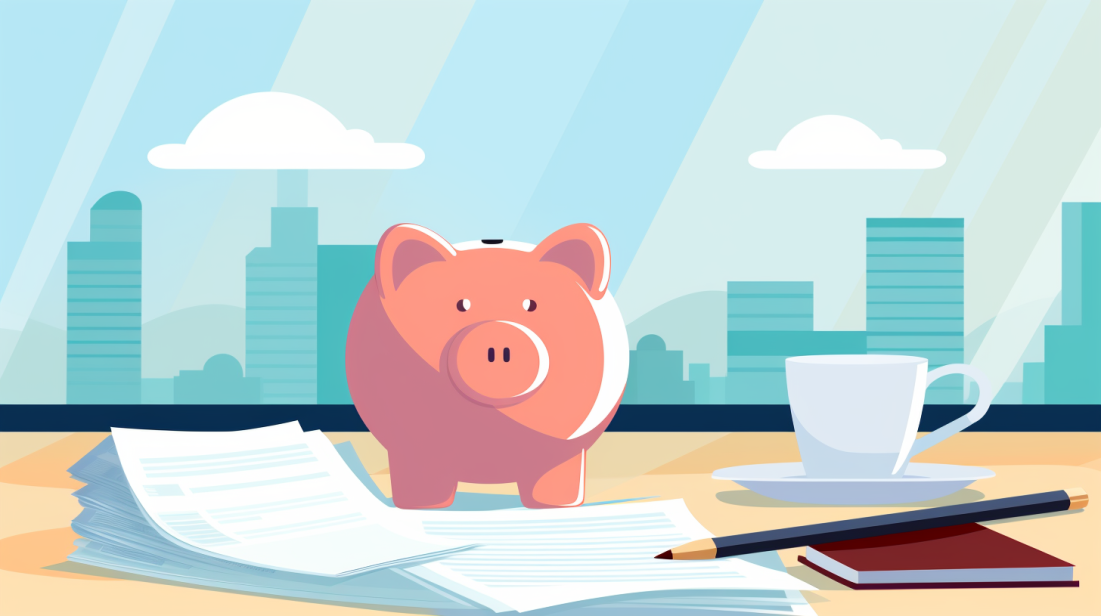Balancing Retirement Savings While Paying Off Debt

Key Takeaways
- Understand your debts and savings. Write them all down.
- Pay off high – interest debts first to save money in the long run.
- Make use of special programs, like 401(k) match plans at work or IRAs for tax benefits.
- Get professional advice from a financial advisor for unique guidance on your situation.
- Building an emergency fund is important. It helps you avoid deeper debt due to surprises.
- To pay off debt faster, earn more money or cut back on spending wherever possible.
- Deciding when and how to retire takes planning. Think about more than just money – consider what makes you happy too!
The Dilemma: Paying Off Debt Versus Saving for Retirement
Paying off debt and saving for retirement at the same time is tough. The two goals seem to fight each other. Should I pay off debt first, or should I start putting money away for my future? These are common questions. It’s tricky because both needs are a big deal. You want to get out of debt quickly so you can use that money elsewhere. High-interest debts like credit cards, take more from your pocket every month. But, if you only focus on paying down bad debts, you won’t have enough in your retirement savings later. Saving as early as possible helps grow your retirement fund due to compound interest. This issue keeps many people up at night! You’re not alone if it feels like a hard road ahead. Making smart choices now will help make life easier down the line though!Evaluating Your Debts
Understanding your financial situation is the first crucial step to sound debt evaluation. We’ll walk through how to prioritize your debts, discerning which ones need immediate attention and which can be handled over a more extended period. From student loans to car payments and mortgages, we’ll help you take stock of all financial obligations, allowing for a clearer view of what lies ahead in your journey towards balance and stability.Understanding Your Financial Situation
 First, let’s look at your money matters. To know where your money goes, write down all that you owe and what you have saved. List out all the debts like credit card debt, student loans, car loans, and mortgage. Do not forget to note the interest rates for each one. Also consider costs for essential things like groceries or utilities. Now track where else your money goes every month—like eating out or cell phone bills—and put them into a list too. This gives you clear details of how much cash comes in and how much goes out each month. It helps makes sure no dollar is lost or wasted!
First, let’s look at your money matters. To know where your money goes, write down all that you owe and what you have saved. List out all the debts like credit card debt, student loans, car loans, and mortgage. Do not forget to note the interest rates for each one. Also consider costs for essential things like groceries or utilities. Now track where else your money goes every month—like eating out or cell phone bills—and put them into a list too. This gives you clear details of how much cash comes in and how much goes out each month. It helps makes sure no dollar is lost or wasted!Prioritizing Your Debts
I want to tell you about an important step in your money journey. It is called prioritizing debts. This means to put the most important bills first. Here are steps you can follow:- Know what you owe. Write down all your debt balances and monthly payments.
- Look at your interest rates next. Start by paying more for the loan with the highest rate.
- Keep up with minimum payments for all other bills. This helps keep your credit score high and avoids late fees.
- If you have student loans, think about an income – based repayment plan.
- Do not forget about your living costs like rent, food, and utilities.
- When done right, reducing debt can help with financial stability in the long run.
Maximizing Your Retirement Savings
To truly maximize your retirement savings, first evaluate if you’re taking full advantage of your employer’s 401(k) match as it is essentially free money. Next, consider opening an Individual Retirement Account (IRA), which offers tax advantages that can significantly boost your long-term savings.Evaluating Your 401(k) Match
Look at your 401(k) match. Early savings for retirement can make money grow. Check if your job offers a 401(k) matching program. Use it to boost your retirement funds. It’s like getting free money from your boss! Let’s say they will match half of what you put in, up to 6% of your pay. If so, save at least that much each month. Doing this lets you get all the match amount offered by them. By doing these steps, you’re on a good path towards building strong retirement savings while tackling debt.Considering Opening an IRA
An IRA is a great way to save for retirement. It gives your money more time to grow. Do you know that starting early can make a big difference? Let’s say, if you put $200 a month in an IRA from age 25, you could end up with over $525,000 at age 65. That’s without adding any extra money! Now let’s talk about types of IRAs. There are two main kinds – Roth and Traditional. With a Roth IRA, the money you put in has already had taxes taken out. This means there are no taxes when you take it out during retirement. A Traditional IRA works the other way around; the money is taxed when withdrawn but not when invested. Pick what suits your needs best! If possible, try to reach the maximum limit each year ($6,000 for people under 50). Don’t worry if this seems too high right now; every little bit helps! Remember: saving for retirement should be part of your plan to pay off debt as well!Creating a Balanced Financial Plan
 It’s essential to build an emergency fund as a safety net for unforeseen expenses. With this in place, you can confidently design a feasible debt repayment plan without jeopardizing your daily living costs. Finally, form a clear vision of when and how to retire; consider factors like income sources, potential benefits from social security, and lifestyle changes that may come with retirement. Remember, achieving financial stability is only possible if the plan caters specifically to your personal financial situation and goals.
It’s essential to build an emergency fund as a safety net for unforeseen expenses. With this in place, you can confidently design a feasible debt repayment plan without jeopardizing your daily living costs. Finally, form a clear vision of when and how to retire; consider factors like income sources, potential benefits from social security, and lifestyle changes that may come with retirement. Remember, achieving financial stability is only possible if the plan caters specifically to your personal financial situation and goals.Building an Emergency Fund
Money for a sudden need is called an emergency fund. This money helps when life throws a curveball. It could be job loss, car repair or any other unexpected expense. Build up this cash buffer to avoid deeper debt due to these surprises. Aim to save three to six months’ worth of living costs like rent, food and utilities into this fund for a safe net.Making a Debt Repayment Plan
Making a debt repayment plan is one of the key steps towards a secure financial future. Here are some tips to help you make your plan:- Write down all your debts: List out debts like your mortgage, car loans, student loans and credit card balances.
- Include all the details: Note down the total amount you owe, interest rates, and minimum payments for each debt.
- Prioritize your debts: Choose whether you will focus on paying off high-interest debt first (the avalanche method) or small balances first (the snowball method).
- Set clear goals: Decide how much money you can put towards paying off debt each month.
- Stick to your budget: Make sure you keep track of where your money is going every month so that you stay within budget.
- Build an emergency fund: Save some cash for unexpected expenses that may come up in order to avoid taking on more debt.
Deciding How and When to Retire
Deciding how and when to retire is a big choice. It takes thought and planning. Here’s a list of some key points to think about:- Look at your money situation. See how much you have saved up.
- Think about your goals in life. What do you want to do when you stop working?
- Check the rules for taking money out of your 401(k). They changed in 2020 because of the virus issue.
- Remember, they will start asking for minimum payments again in 2021.
- If you have student loans, make sure to add them into your plans.
- Making a budget can help you see where you can save more.
- Cut back on things that aren’t needed like fancy dinners or new clothes.
Strategies to Boost Both Debt Repayment and Retirement Savings
 Dive into practical strategies that can supercharge your debt repayment efforts and optimize your retirement savings. Learn how to reduce debt payments, boost income for retirement, explore the snowball or avalanche methods, consider refinancing and more! Unlock these powerful tools to achieve financial freedom sooner. Let’s journey further..
Dive into practical strategies that can supercharge your debt repayment efforts and optimize your retirement savings. Learn how to reduce debt payments, boost income for retirement, explore the snowball or avalanche methods, consider refinancing and more! Unlock these powerful tools to achieve financial freedom sooner. Let’s journey further..Finding Solutions to Reduce Your Debt Payments
I am always looking for ways to cut down my debt payments. Here are a few ideas that have worked well for me:- Creating a budget: I track what I earn and how much I spend each month.
- Cutting discretionary expenses: I trim out things that are not so important, like expensive coffees or unused gym memberships.
- Exploring debt consolidation: This way I can combine my debts into one payment with a lower interest rate.
- Checking out student loan repayment plans: If school loans are a big part of my debt, I look for programs where my payments get based on what I earn.
- Making use of special rules for 401(k) accounts: In 2020, they changed the rules and let people take money out without having to pay extra money to the government.
- Looking into groups that offer help: Sometimes, places like Habitat for Humanity work with other groups like Consolidated Credit to help people deal with their debt while also saving for retirement.
Supercharging Your Debt Repayment
Paying back debt faster can give you peace of mind. Find ways to bump up your monthly payments. You could work a part-time job or cut out fun buys for some time. Also, try the snowball method: pay off smaller debts first to feel good and stay motivated. The avalanche method is another way: start with the debt that has the highest interest rate. This will save you money over time. No matter what, staying focused on your goal will help supercharge your debt repayment.Boosting Your Retirement Savings and Income
Starting to save for retirement early is a key step I can take. Here are some ways I could boost my retirement savings and income:- Save part of my salary for retirement.
- Get all money from an Employer’s 401K Match Program.
- Open a Roth IRA account to take care of future taxes.
- Look at high – quality government bond funds for safe savings.
- Put extra money in money market funds and stock – based funds to grow.
- Cut spending in areas like eating out and shop sales to save more.
- Work part time in retirement to keep active and earn money.
Consultation with Financial Advisors
 It’s essential to seek advice from financial advisors as they provide expert guidance on your unique situation. They can help you navigate the path of debt repayment and retirement savings. From understanding how to pay off debts efficiently, to deciding which retirement plan best fits your goals, their expertise is invaluable. Remember, it’s crucial to ask the right questions about your finances – this open dialogue will enable them to offer tailored strategies towards achieving your financial objectives.
It’s essential to seek advice from financial advisors as they provide expert guidance on your unique situation. They can help you navigate the path of debt repayment and retirement savings. From understanding how to pay off debts efficiently, to deciding which retirement plan best fits your goals, their expertise is invaluable. Remember, it’s crucial to ask the right questions about your finances – this open dialogue will enable them to offer tailored strategies towards achieving your financial objectives.Seeking Professional Advice
It’s smart to seek help from a financial advisor. They can guide you on how to balance paying off debt and saving for retirement. For example, Consolidated Credit works with groups like Habitat for Humanity. Together, they help people build homes and grow wealth. A skilled advisor can show you options like 401(k) plans at work that match your savings. They might also suggest making a budget or cutting extra costs to save more money. Another idea could be using programs such as debt consolidation loans or federal student loan repayment plans. These can lower your payments each month so you have more money left over for retirement savings!Learning to Ask the Right Questions
Seeking professional advice is vital when dealing with debt and retirement savings. Here are important questions to ask:- What is the best way to balance paying off my debt and saving for retirement?
- How can I make better use of my employer’s 401(k) match program?
- Should I think about opening an IRA to boost my retirement savings?
- What strategies can help me pay down my debt faster?
- Can I get a handle on managing both student loans and credit card debt at once?
- How can a budget help me meet both living costs and financial goals?
- Which debts should I prioritize first for payment?
- Is delaying retirement an option that fits into my plan?
- Are there any useful tools or resources that should be part of my retirement savings strategy?
The Takeaway: Balancing Retirement Savings While Paying Off Debt
 Navigating the tricky balance of building up retirement savings while paying off debt involves careful evaluation of psychological factors and strategic decision-making between investing or paying down debt, but with a well-thought-out financial plan it’s possible to accomplish both goals effectively.
Navigating the tricky balance of building up retirement savings while paying off debt involves careful evaluation of psychological factors and strategic decision-making between investing or paying down debt, but with a well-thought-out financial plan it’s possible to accomplish both goals effectively.Considering Psychological Factors
Your mind plays a big role in money matters. You feel stress when you think about debt. This is normal. But don’t let fear stop you from saving for your future. You may prefer to pay off all debt first and then save. Or, you might want to balance both at the same time. Either way is okay! Just make sure not to delay retirement savings for too long because this can harm your finances later on, as stated in the important facts above.Weighing Investing vs Paying Down Debt
Making a choice between investing and paying down debt is not easy. It calls for understanding your own money matters well. First, look at the kind of debt you have. If it’s high-cost debt like credit cards, it’s smarter to clear this first. The reason? These debts come with big interest rates. Next, think about your retirement savings plan options. Check if your job offers a 401(k) match program. That’s free money which can grow over time thanks to compound interest! Hence, taking part in such a scheme is often wise before tackling low-interest or “good” debts like student loans or mortgages.How Does Balancing Retirement Savings and Paying Off Debt Affect Mental Health and Well-being?
Balancing retirement savings with paying off debt is crucial for long-term financial stability. However, the impact of debt on mental health cannot be overlooked. The burden and constant worry about managing debt can lead to stress, anxiety, and a decline in overall well-being. Prioritizing both retirement savings and debt repayment is important for a healthy financial future and improved mental health.






